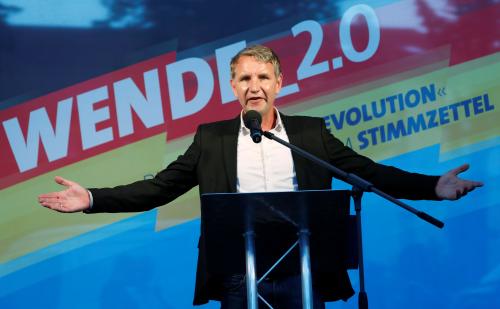After Annegret Kramp-Karrenbauer’s steely performance at the CDU party conference, the leadership contest in Germany’s center-right party is on hold, for now, argues Constanze Stelzenmüller. This post originally appeared in the Financial Times.
Snark is not a quality ordinarily associated with Germans, much less with eastern German Protestant pastors. But how else to describe the Bible verse local clergy chose for the service that opened the Christian Democratic Union’s tensely anticipated party conference in Leipzig last Friday: “Who, then, is the greatest in the kingdom of heaven?” (Matthew, 18)
It appeared to be a jab at a nasty public squabble over the very earthly problem of who should succeed Chancellor Angela Merkel, whose fourth (and, she has said, last) term will end in 2021. Annegret Kramp-Karrenbauer, leader of the Christian Democrats, defence minister and Ms. Merkel’s heir-presumptive, has been struggling for the past year to assert her authority. The CDU’s polls are stuck between 25 and 29 per cent, and her own name is languishing near the bottom of the popularity lists.
Before the Leipzig conference, at least four contenders had flagged their availability to rule the warring tribes of the CDU. A members’ revolt looked like a distinct possibility. Ms Kramp-Karrenbauer was combative, but also very nearly anaesthetised her audience with a 90-minute speech that waded heavily into policy issues.
At the very end, she whipped out a surprise flash of steel, saying that anyone who wanted to challenge her “should speak their minds today and end it there — here and now and today.” Cue a stunned silence, followed by a full seven minutes of applause. The rivals swore fealty, or stayed quiet.
Ms. Kramp-Karrenbauer has won an important skirmish, but her opponents are undefeated. She has bought time, but so have they. The businessman Friedrich Merz, who lost out to her in the party leadership contest a year ago, has not held a political office since 2002. He has an unprepossessing habit of swerving between promises of loyalty and personal attacks from the sidelines. Yet he retains the enthusiastic support of conservative business types, who resent Ms. Merkel’s liberal social policies.
Jens Spahn, the health minister, also lost out on the leadership. He is disliked by not a few in the party for his raw ambition, harsh criticism of Ms. Merkel, and hardline instincts. However, the single-minded dedication with which he has worked his €15bn portfolio has raised his position in the polls and impressed even his critics. And, at 39, he can afford to wait.
Armin Laschet, the liberal minister president of North Rhine-Westphalia, has long been an advocate of CDU-Green coalitions — a likely option for the next German government. Yet despite the fact that he governs Germany’s most populous state (and with it the biggest CDU subdivision) he trails the other men, possibly because he has so far confined himself to needling his party chief from a safe distance.
Bavarian minister president Markus Söder leads a wealthy, powerful state (as well as the CDU’s sister party, the Christian Social Union) whose chieftains doggedly joust for the chancellorship and fail dramatically every time. After losing the CSU’s cherished absolute majority in a state election a year ago, with a campaign that mimicked the rhetoric of the hard-right Alternative for Deutschland, he changed tack from reactionary to reformer and fierce adversary of the AfD. Mr Söder’s punchy speech at the Leipzig conference set off a buzz of speculation: could he be the one to break Bavaria’s losing streak in Berlin?
To keep her job and stake out her claim for higher office, Ms. Kramp-Karrenbauer now faces a brutal, twofold test. As party chief, she must build bridges between the camps represented by her rivals: traditionalists and modernisers, social conservatives and liberals, business and labour. She also has to bring to heel rightwing fringe groups who seek to work with the AfD, and woo angry voters away from it. She needs to reinvent the CDU as a popular party at a time when both the AfD and the Greens are laying claim to the same title.
As defence minister, she also sits in the ejector seat of the cabinet, besieged by intractable problems, irritated or unreliable allies, and real-world security threats that many Germans seem to prefer to ignore. Coming from a career in domestic politics, she faces a steep learning curve.
Her ideas about the future of Europe or a protection initiative for Syria were panned; at security conferences abroad, she seemed insecure and remote. But a recent speech on the future of the German armed forces was justly applauded.
To her credit, Ms. Kramp-Karrenbauer has guts, principles, and the ability to bounce back and fight. Her rivals have yet to make a plausible case that they could do better. But meeting in Leipzig — where courageous citizens marching against the Communist regime in 1989 helped bring down the Berlin Wall — ought to have been a potent reminder that history waits for no one.







Commentary
The power struggle to lead Germany’s CDU has been postponed
November 26, 2019